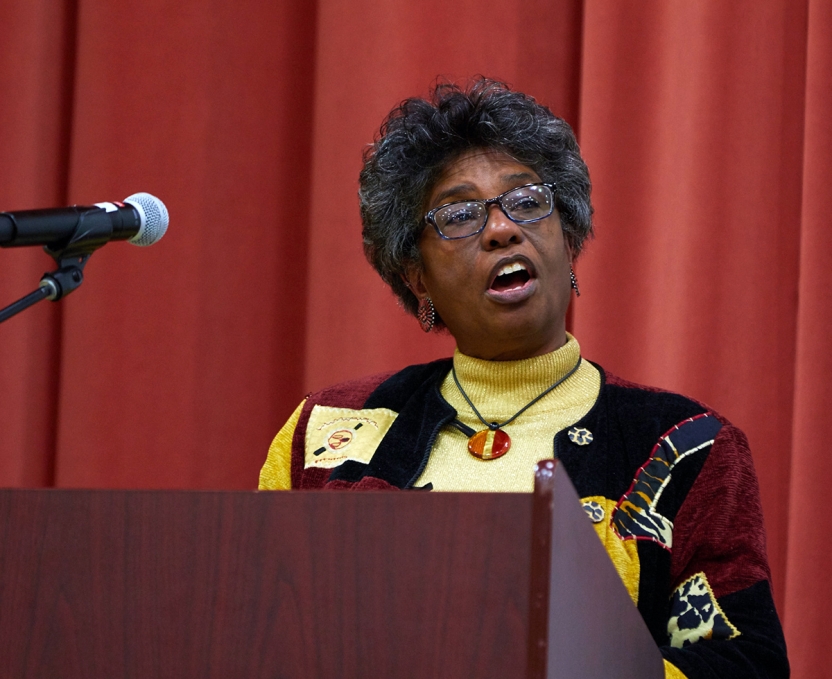Speaker Describes How the Liberal Arts Needs to Evolve

MIDDLEBURY, Vt. — The dean of the Ivan Allen College of Liberal Arts at Georgia Tech shared her views on merging the liberal arts into an ever-changing world of science and technology on October 25 at Wilson Hall in a talk titled ”Bold Futures: Integrative Liberal Arts as Leverage for Evolutionary Change.”
Jacqueline Royster, as the senior administrator for the liberal arts at one of the country’s leading engineering universities, offered a unique perspective for the year-long community conversation called Envisioning Middlebury.
At Georgia Tech, Royster explained, the liberal arts has located itself at a crossroads with technology. Her college of liberal arts has no academic departments; rather the college is divided into six schools — economics, history and sociology, modern languages, public policy, international affairs, and literature, media, and communication — to encourage interdisciplinary study, enrich knowledge making and problem solving, and engender respect and conscious regard for others.
“We live in a fast, changing, highly scientific and highly technological world,” she said. “And this world still needs a clearer, broader, or more vibrant sense of who we are as people who do, and have always done, great work in a complex world.
“Thinking about the liberal arts as a 21st-century reality we boldly position ourselves at the crossroads of liberal arts and technology. Perhaps as a function of being located at a fairly unlikely place in higher education, we feel obligated to take responsibility for being a leading edge for innovation and leadership. I suggest that at Georgia Tech, unlike at liberal arts colleges that function in an environment of liberal arts values, principles, and practices, we have had to learn to be very quirky in making a place for ourselves.”
After being introduced by President Laurie L. Patton, the dean, professor, and deep thinker about ways to connect the human experience to the technological world opened her talk with an original 11-minute allegory that drew upon themes from “Star Wars.” There were frequent references to Jedi warriors and the Force, and yet it was clear that Royster was really talking about the challenges faced by higher education, particularly the need to derive benefit from rapid advances in technology while striving to be inclusive and respectful of people from different backgrounds.
“The question I raise is this,” Royster asked after her tale. “How might we in the liberal arts might evolve to keep pace amid ever-present transitions and changes in our 21st-century world?”
After stating “the liberal arts has historically been the gold standard for higher education,” Royster added there remains “the lingering need to make peace and prosperity a global priority, and an equally lingering need to understand as quickly as we can the ways and means of the human factor in relations related to future worlds.”
To achieve peace and prosperity as a global reality will take “head, heart, stomach, backbone, and especially imagination,” the guest speaker said, and at that point Royster projected her only visual aid of the evening: a slide demonstrating her view that we all need to practice honor, respect, hospitality, grace, generosity, dignity, loyalty, humanity, courage, and justice in our lives.
Royster, who is well acquainted with Middlebury from her years (1991–2002) as a visiting professor at the Bread Loaf School of English, offered four different approaches or “sightlines” through which the College might look at liberal arts in the future.
First, Royster said, education should be viewed as a means toward personal development, i.e., a way for people to develop their talents, skills, and abilities. People “need to learn about themselves as human beings,” about how they are connected to the world, about what is going on around them, and about what they can do to effect positive change.
Second, education should be looked at in the context of workforce development. “People need good and meaningful work. The ideal would be that more people might get paid to do the things they might be inclined to do for free because they are inspired and excited and find joy in doing this work.”
Third, education should serve a purpose in terms of global citizenship development. “People need to understand themselves within the context of others who may be like or unlike us. Our planet is just too small and too fragile for us to not do otherwise.”
And fourth, Royster has been thinking about education “as a love of learning — as an opportunity to see, to envision more in an ever-evolving sense of what we need to do with ourselves and our talents.”
Royster advocates for both innovation and for learning to take place across the usual boundaries of departments and disciplines. At Georgia Tech “we are integrative liberal arts. We don’t expect everybody who cares about liberal arts to live on the edges on which we live, but like our science and technology colleagues, we see the opportunity to rise to the challenges of the 21st century and what we know is that we can do that.”
